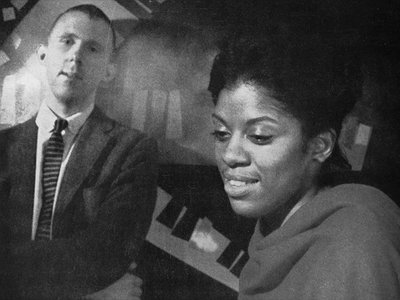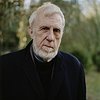How do you make use of technology? In terms of the feedback mechanism between technology and creativity, what do humans excel at, what do machines excel at?
I don't use technology in any kind of mature, creative sense and it's even a challenge to do limited typing when answering emails. So, for me technology is pretty much out, other than hearing and recording music and watching films.
Collaborations can take on many forms. What role do they play in your approach and what are your preferred ways of engaging with other creatives through playing together or just talking about ideas?
Collaboration has been most essential. Prior to joining NEC in the autumn of 1967, my prime collaborator was Jeanne Lee. We spent hours at Amelia Lehrfield’s studio on 113th St. in New York working every Sunday without having performances mandate our time spent. We had a chance to get to know each other. When coming to NEC, I kept my relationship with Gunther Schuller as my primary educator alive.
Of course, his schedule became more and more limited and I was fortunate if I could have private meetings with him five times a year. Then most of my collaborations have been related to NEC with students, alums and fellow faculty. One exception has been working with Houston Person, a wonderful tenor saxophonist with a blues background. Primary collaborators have been Ricky Ford who is the product of the community services department that I had the pleasure to co-chair for many years. Dominique Eade has been another very important collaborator. She's on our voice faculty and we worked on various repertoire. Three alums have been very important: Sara Serpa, Christine Correa and David “Knife” Fabris. Also, Hankus Netsky, Daryl Lowery, Andrew Rathbun, Eden MacAdam-Somer, and pianist Frank Carlberg and to a degree Jason Moran and Danilo Perez. An extremely important collaborator has been Ken Schaphorst who has devoted time and energy to fantastically score much of my music. He is the head of the NEC Jazz Studies department. Hankus Netsky and Eden MacAdam-Somer co-chair NEC’s Contemporary Improvisation department. It's been a pleasure working with Eden on Blue Gardenia and much of the Dr. Mabuse repertoire.
I’m looking forward to a collaboration with Anthony Braxton at the end of the year in which we will be diving into the American Songbook at great lengths. That is a rather fun collaboration since he is a master on the subject and I am no beginner either.
How is preparing music, playing it live and recording it for an album connected? What do you achieve and draw from each experience personally? How do you see the relationship between improvisation and composition in this regard?
Albums have been very important in my career and I hope that recordings do not only become available digitally. Often, I prepare in advance and this can be very successful when I’m working on solo projects. Although these are thoroughly practiced, I spend a great deal of time thinking about music away from the piano, thinking of the plots, characters, themes, and even visual scenes that I challenge myself to orchestrate for solo piano and with my various talented partners.
Take a piece like an old standard, “Star Fell on Alabama”. What do I feel about it now? I brought that back into my repertoire because of a plane trip to Europe from the United States where we heard on the plane about the killing of the young school girls in Birmingham, Alabama. This greatly upset my friend and duo partner, Jeanne Lee, and I, and I’ve never played the piece the same way again. There is the theme, some chords, some relationship to the bridge, but I bring in a lot of anger- sometimes bombs. A related piece is an original called Birmingham U.S.A. which describes the hatred and the intolerance without referring to the original melody at all. Here, an old standard and my mood can influence a new piece of music that may be related but using totally different musical tools.
How do you see the relationship between the 'sound' aspects of music and the 'composition' aspects? How do you work with sound and timbre to meet certain production ideas and in which way can certain sounds already take on compositional qualities?
Sound aspects are extremely important and I’m told that I have special ways of pressing keyboard notes where echoes seem to come. Aaron Hartley coined these as my “Ghost Tones” many years ago. I hope I don’t sound self-satisfied if I say timbre is somewhat my own and I don’t devote time to it. My challenge is to add structure on longer pieces, occasionally dipping into 20th century European “serious music,” and film music and plot, that maybe don’t use the themes of the film. Film has seemed to have satisfied me totally.
Our sense of hearing shares intriguing connections to other senses. From your experience, what are some of the most inspiring overlaps between different senses - and what do they tell us about the way our senses work? What happens to sound at its outermost borders?
Composition is very important when some pieces are made with passion, or if I’m trying to recollect what Al Green, Ray Charles, or Abbey Lincoln might do, that form is minimally important because I don’t want to lose this feeling of devotion I have for my model. And so, again, storyboarding dictates the form. I’m toying with the idea of letting the audience know what the stories mean to me.
Senses are very important. I love light, the colour of mountains, the coziness of a basement apartment. I am an avid film-goer and I can’t begin to explain how my inspiration comes from the films because even if I don’t like the music, I can relate to it. Cinematography is very important; the hand movements of the camera. the close ups, the timing of all of this. How do I separate the theme from the plot? How do I intermingle? Sometimes not successfully.
What happens to sound at its outmost borders? I have studied with Hankus Netsky who is a supporter and fan, and he may feel that there are times that I disassociate myself from the film noir aspects and really concentrate on the elements of the original style. I often try to do this for 2-3 minutes out of 5 minutes. I have to oscillate between one and the other, and I have to communicate this to the audience, and to myself, and more important, to the musicians who are collaborating with me.
Art can be a purpose in its own right, but it can also directly feed back into everyday life, take on a social and political role and lead to more engagement. Can you describe your approach to art and being an artist?
I often take a political role. When first coming to NEC, I fought racism (as I have for most of my life) and got involved with the anti- fascism movement in Greece and what happened on April 20th 1967. Some of these themes persist and I was reminded of this with the assassination of MLK and what happened that day in Boston. What happened when I saw the mothers walk every Thursday noon to protest Argentina for taking away their children. Recently, though, I have gone back to other memories that are less political. By nature, I’m very solitary and I really like to connect with people through a window.
It is remarkable, in a way, that we have arrived in the 21st century with the basic concept of music and performance still intact. Do you have a vision of music and performance, an idea of what they could be beyond their current form?
It is remarkable that in the 21st century there’s so much going on. My conservative side reminds me that I hate to have many traditions abolished or torn down. For so many people technology, self-releasing music, being with constant friends and collaborators are very important, but I cannot follow this myself.
There will be great things happening in the 21st century and there are many ethnic musics that really have not been delved into. When starting the Third Stream department at NEC in 1972, I would often beg students to think of one music that represents a past love and try to train one’s subconscious to experience another type of music from a completely different geographical part of the world; maybe alien in mood and timbre.
Great teaching takes a great amount of time on the part of both the teacher and the student. Today, some of the most exciting music that will happen is with pop music. Will they bring in more harmony, modulating melodies, a little bit of risk without abandoning the melody and/or harmony, without only appealing the underground, etc.



